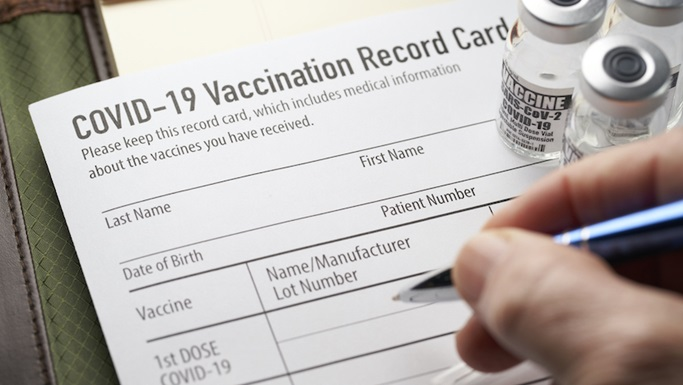Should COVID-19 Vaccines Be Mandated?

Image Courtesy of UChicago Medicine
By Gillian Richards
At this point, COVID-19 vaccines have not been mandated on a state or national level. Yet, we have seen an uptick in mandates from private institutions and universities such as Duke and Cornell. Even Catholic Notre Dame has announced that it will require students to be vaccinated before returning to school this fall.
This may be good news for some. After all, is it not for the common good that enough people receive the vaccine to reach herd immunity? Isn’t the best way to do this through mandates, whether on the federal, state, or private institutional level? And as Christians, are we not called to care for our own health and that of others?
The Common Good
Well, yes. But to avoid mischief, we need to look carefully at glib appeals to the common good. Pope Paul VI in Gaudium et Spes defines the common good as “the sum of those conditions of social life which allow social groups and their individual members relatively thorough and ready access to their own fulfillment…Every social group must take account of the needs and legitimate aspirations of other groups.”
This affirms our obligation to care for the most vulnerable. At the same time, the good of individuals must include their freedom to make choices concerning their own health, and to follow their properly formed consciences. No just appeal to the common good can abrogate these freedoms.
On the first point, medical decisions are not generic and universal. They are matters of prudential judgment involving all sorts of concrete personal details. Some may conclude that the known and unknown risks of the current COVID-19 vaccines outweigh the likely benefits.
But, what about the benefits to others of receiving a vaccine? Isn’t a coronavirus vaccine mandate, especially for schools and universities, just like the requirements schools have for vaccines such as polio and measles?
Actually, no. The vaccines schools currently require were tested for years before the FDA approved them. But the agency has only authorized the three COVID-19 vaccines for emergency use. They are still experimental. The qualification of emergency use means that because of high-demand, these three vaccines were fast-tracked through the approval system, so they haven’t been studied for as long as other vaccines.
It’s questionable, to say the least, that children and young adults should be forced to receive an experimental vaccine for a disease that poses less risk to them as a group than the seasonal flu. Young people also tend to exhibit less severe symptoms than much older people. So, we are far less likely to transmit the virus to others.
Moral Concerns
Beyond this, there is an ongoing debate among thoughtful Catholics on the morality of these vaccines because they have been tested and/or developed using cell lines derived from an aborted human being. Some argue that fetal tissue from which HEK-293 was derived is remote enough that one can receive the vaccine in good conscience. (HEK-293 is the cell line taken from an aborted fetus in 1972, which Johnson & Johnson used to develop their vaccine and which Pfizer and Moderna use for testing.) They argue that the use of biological material from an illicit origin is licit as long as there is a clear separation between the production and death of an embryo (an aborted fetus in the case of HEK-293) and the researchers currently involved in research and experimentation.
But others point to the authoritative 2008 document from the Congregation for the Doctrine of the Faith, Dignitas Personae. It argues that while obtaining the genetic material from an aborted child is inarguably illicit, receiving a vaccine that is only available because of research done on the child is acceptable when the goal is to protect vulnerable populations. However, it also argues that Catholics must still protest the use of material from aborted children and should not receive vaccines that use the material in production.
In light of this, some Catholic ethicists argue that the use of this fetal cell line is a formal cooperation with the abortion and the desecration of the fetal remains. And the use of vaccines which were developed using HEK-293 is a material cooperation with this illicit lab use.
Some vaccines are more implicated than others. The Johnson & Johnson vaccine used fetal cell lines in its development and testing, which Dignitas Personae strongly dissuades. Pfizer and Moderna used fetal cell lines only in testing.
This does not erase the problem entirely, according to the statement “To Awaken Conscience,” signed by Drs. Catherine and Michael Pakaluk, Bishop Joseph Strickland, and others. “Even if, as a matter of general principles,” they argue, “it is not always morally illicit to use such abortion-tainted vaccines temporarily, in extreme necessity, and even then under strenuous protest, the use of such vaccines must never be advanced as mandatory, or as a universal duty.”
To impose a COVID-19 vaccine mandate, especially on Catholic college campuses, would be to dismiss the moral convictions of Christians who view the vaccines as abortion-tainted.
What About Exemptions?
But can’t those with moral reservations get religious exemptions? Perhaps. But if opting out of a mass mandate is simple, why bother mandating it in the first place? What’s more likely is that students who receive exemptions will be badgered and restricted, perhaps even forced to attend classes online. A vaccine mandate is coercive by nature, even if exemption is technically an option.
Appeals to public health do not magically dissolve the threat of tyranny. Quite the contrary. As Albert Camus said, “The welfare of the people in particular has always been the alibi of tyrants, and it provides the further advantage of giving the servants of tyranny a good conscience.”








